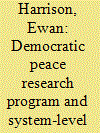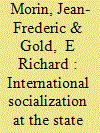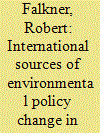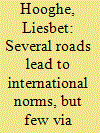| Srl | Item |
| 1 |
ID:
095378


|
|
|
|
|
| Publication |
2010.
|
| Summary/Abstract |
Does membership in Intergovernmental Organizations (IGOs) affect states' human rights behavior? One might expect IGOs with a specific human rights mandate, like the International Labour Organization or the Council of Europe, to have a positive effect on the human rights practices of their member states. But what about other sorts of IGOs, particularly those with no direct connection to human rights issues? This study employs cross-national data on abuses of "physical integrity rights" for 137 countries over the period 1982-2000 to test the hypothesis that IGOs can promote the diffusion of human rights norms by providing venues for interstate socialization. Recent empirical work on IGOs has suggested that this sort of socialization effect can play an important role in promoting democracy and can also lead to a more general convergence among states' interests. The results presented here suggest that IGOs can have a surprisingly powerful influence on states' human rights practices as a result of this process.
|
|
|
|
|
|
|
|
|
|
|
|
|
|
|
|
| 2 |
ID:
094693


|
|
|
|
|
| Publication |
2010.
|
| Summary/Abstract |
In a path-breaking article, Wade Huntley reinterpreted Kant's pacific union as a systemic phenomenon. This generated a new wave of inquiry into the evolutionary expansion of the democratic peace. The resulting literature examines how the effects of the pacific union vary over time and with the strength of the global democratic community. It investigates the possibility that the democratic zone of peace may spread through spillover effects, socialization dynamics, and positive feedback. In so doing, it has moved democratic peace research beyond the 'separate peace' formulation. Currently, however, this literature has accumulated insights on an ad hoc basis. New hypotheses have been developed and tested without systematically considering how these insights contribute to established knowledge about the democratic peace. This article uses philosophy of science criteria to assess the contributions of the systemic democratic peace literature. It shows how systemic analysis of the democratic peace is progressive in terms of Lakatos's methodology of scientific research programs. The article first considers how Lakatosian methodology has been applied to dyadic democratic peace research. Next, it refines this account of the democratic peace research program to make it more suitable for evaluating the contributions of the systemic literature. The last section shows systemic analysis is compatible with the Lakatosian vision of a cumulative series of theories (monadic-dyadic-systemic) building logically from a core assumption. It then uses the established structure of dyadic inquiry to frame a wide-ranging agenda for a second generation of democratic peace studies.
|
|
|
|
|
|
|
|
|
|
|
|
|
|
|
|
| 3 |
ID:
153882


|
|
|
|
|
| Summary/Abstract |
This article synthesizes the results of two quantitative analyses, one at a macro and the second at a micro level, to shed light on the process of international socialization. The first analysis examines the seeming adoption of intellectual property norms at the state level while the second looks at the internalization of similar norms at the individual decision maker level. Both pay special attention to foreign education and capacity-building courses as carriers of US norms to developing countries. By triangulating the results of these analyses, we develop a more nuanced view of international socialization processes than analyses centred at only one level. We provide clear evidence that institutionalization of foreign norms often takes place prior to individual persuasion rather than as a result of it. We show that different socialization types (acculturation and persuasion) and the transmission of different idea types (causal and normative beliefs) may simultaneously operate in opposing directions. These conclusions reveal a bias in previous studies that focussed at only one level of analysis and support calls for greater eclecticism in the levels of analysis.
|
|
|
|
|
|
|
|
|
|
|
|
|
|
|
|
| 4 |
ID:
076348


|
|
|
|
|
| Publication |
2006.
|
| Summary/Abstract |
China's agricultural biotechnology policy has undergone a profound transformation over the last decade, from a strongly promotional to a more precautionary approach. From the 1980s onwards, China invested heavily in biotechnology development and in the early 1990s emerged as the leading biotech country in the developing world. In the late 1990s, however, it halted the authorization of new genetically modified crops and introduced stringent safety regulations. This paper investigates this policy shift and argues that international factors have played a central role. Two trends, in particular, are identified as key sources of the move towards greater precaution: China's ongoing international socialization, particularly in the context of the international scientific debate on biosafety and the negotiations on a biosafety treaty; and the growing globalization of agriculture and trade, which has exposed China to international competitive forces and trade restrictions in food trade. As the case of genetically modified food in China shows, political integration and economic globalization can work together to promote a strengthening of the domestic environmental policy agenda.
|
|
|
|
|
|
|
|
|
|
|
|
|
|
|
|
| 5 |
ID:
066870


|
|
|
| 6 |
ID:
096040


|
|
|
|
|
| Publication |
2010.
|
| Summary/Abstract |
This article offers a much-needed conceptual analysis of China's emerging international agency in Central Asia. In particular it engages with the apparent susceptibility of Central Asian states to China's normative power. The contention is that the emphasis on the dynamics of international socialization offers a relevant framework for evaluating Beijing's capacity to engage regional states. By relying on its normative power, China has gradually attracted Central Asia into its sphere of influence through the promotion of various initiatives for regional cooperation consolidated in the Shanghai Cooperation Organization. Such conceptualization of Beijing's conditioning propensity reflects upon China's international role(s) in the region.
|
|
|
|
|
|
|
|
|
|
|
|
|
|
|
|
| 7 |
ID:
066869


|
|
|
| 8 |
ID:
138299


|
|
|
|
|
| Summary/Abstract |
Does contact with democratic governance make state officials in authoritarian regimes more democratic? While studies of democratic diffusion are built on the inherent assumption that exposure to democratic practices shapes the attitudes of domestic actors toward democracy, scholars of international socialization are more skeptical about such micro-effects. Drawing on insights from sociology and social psychology, I examine what type of cross-national activities can socialize Moroccan state officials into democratic governance. The results of cross-sectional, multivariate regression analyses based on original survey data emphasize that, in authoritarian contexts, transnational linkage manifests the potential to democratize only if it involves practical experience, a condition fulfilled by cooperative exchange within transgovernmental networks, but not by more diffuse types of linkage such as international education and foreign media broadcasting.
|
|
|
|
|
|
|
|
|
|
|
|
|
|
|
|
| 9 |
ID:
133935


|
|
|
|
|
| Publication |
2014.
|
| Summary/Abstract |
This paper shows how UN Security Council resolutions can facilitate the international socialization of an Islamist political actor. The study undertakes a process-tracing analysis of the negotiations and attempts to implement UNSC Resolutions 1559 and 1701 and then assesses their impact on Hezbollah's agency and political identity. The author argues that UNSC resolutions can inform processes of social influence that directly affect the activity of non-state actors and then cause international socialization. According to the analysis proposed international socialization has produced three main effects on Hezbollah that are: increased accountability; a shift in its legitimacy paradigm; and a mutation of Hezbollah's relation with the Lebanese state.
|
|
|
|
|
|
|
|
|
|
|
|
|
|
|
|
| 10 |
ID:
160702


|
|
|
|
|
| Summary/Abstract |
Over the past three decades, Taiwan has been struggling to gain an advantage and develop its role in Asia. This island has strived to balance its asymmetric relationship with China by engaging in regional integration in Southeast Asia and beyond. In the 1990s, the Taiwan government initiated the first wave of its Go South Policy aimed at building links at business and government levels with that region. The institutional and social legacy of the Go South Policy contributed to the making of the New Southbound Policy (NSP) which was proposed toward the end of 2015. This paper will unpack Taiwan’s presence in Southeast Asia by highlighting the international socialization process of the NSP and Taiwan’s strategic interaction with the region. It consists of four sections: the first section introduces the concept of international socialization. The second section discusses the positioning of Taiwan’s previous Go South policies. Starting with the shift from a mentality of “Taiwanese Asia” (Taiwan de yazhou, 臺灣的亞洲) to one of “Asian Taiwan” (Yazhou de Taiwan, 亞洲的臺灣), it describes in detail how Taiwan’s successive southward engagement initiatives have blended into the international socialization processes in the region. The third section highlights the relationships the policy’s key actors and stakeholders, including transnational actors, are establishing with their counterparts in Southeast Asia and the new social linkages that are currently being promoted. This includes the activities of Taiwanese residents in Southeast Asia and Southeast Asian migrants in Taiwan. The paper concludes by summarizing Taiwan’s international socialization in Asia.
|
|
|
|
|
|
|
|
|
|
|
|
|
|
|
|